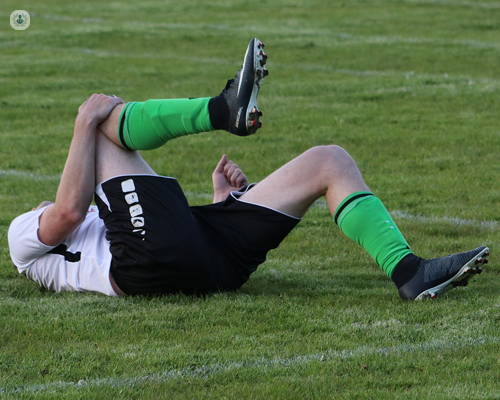A comprehensive overview of knee injuries sustained in football
Written in association with:Football is an extremely popular sport, played by millions across the world. However, unfortunately it is easy to sustain injuries while playing football. Highly respected consultant orthopaedic surgeon Mr Paul Sutton explains the most common knee injuries, prevention and when these injuries require surgery.
What are the most common knee injuries sustained in football?
Knee injuries are very common in football and can range from minor to very significant injuries. The most common knee injuries sustained in football include anterior cruciate ligament (ACL) tears, medial collateral ligament (MCL) injuries, and meniscal tears.
These injuries can occur due to contact, non-contact, or in some cases, overuse. Other knee injuries that can occur in football include posterior cruciate ligament injury, patellofemoral pain syndrome, tendonitis, bursitis, Osgood-Schlatter’s syndrome and occasionally fractures.

Some players are particularly at risk of specific injuries. For example, female footballers are at much higher risk of ACL ruptures compared with male players. However, the reasons for this are not entirely understood.
Is there any way to prevent knee injuries in football?
There are several ways to try and prevent knee injuries in football, which are as follows:
- Avoiding playing on poor quality surfaces.
- Wearing appropriate equipment such as knee pads, shin guards, and cleats. Knee pads and shin guards can prevent injuries caused by direct impact. There is debate in football about the role of footwear and the risk of knee injury, which remains a little unclear. However, most knee surgeons would advise footwear appropriate to the conditions and playing surface.
- Building strength and flexibility in the legs through a regular exercise and a conditioning programme.
- Properly conditioning for the sport and gradually increasing the intensity of training is important and there is scientific evidence that in high-risk groups such as female footballers an injury prevention programme reduces the risk of ACL rupture.
When is a knee injury sustained in football serious?
A knee injury is more likely to be serious when there is significant pain, swelling, instability, or loss of function. If a knee injury is accompanied by a popping or snapping sound and/or immediate swelling this can be a sign of a cruciate or other ligament injury. Inability to bear weight on the affected leg could also indicate a serious and should be evaluated by a doctor or physiotherapist.
How are knee injuries assessed?
A knee specialist will typically assess the knee by carefully listening to the details of how the injury happened and then carry out a physical examination. This examination may include testing the range of motion and stability. Special investigations though use of X-ray, MRI or CT scan are often needed.
Which types of knee injuries in football usually require surgery?
Not all knee injuries will require surgery. Most will need physiotherapy, some may need a protective brace or cast, and a small number may need an operation. Knee injuries that may require surgery include ACL or other ligament tears and meniscal injuries. Even when the ACL is torn, not all patients need an operation to treat this. However, surgery is usually recommended for young patients, patients experiencing instability or if there is a significant loss of function.
How can people return to football after sustaining a knee injury?
The return to football after a knee injury will depend on the severity of the injury and the type of treatment that was needed. Physical therapy and rehabilitation are often necessary to regain strength, flexibility, and range of motion.
The return to sport should be gradually progressed, beginning with low-impact activities and controlled exercises, before gradually increasing the intensity. A successful return to sport can be achieved through a proper and personalised rehabilitation plan. After a serious injury, it is also important to consult with a doctor and physical therapist before returning to sport, in order to ensure that the knee is fully healed and it is safe to return to the pre-injury level of activity.
If you have sustained a knee injury through football and would like to book a consultation with Mr Sutton, you can do so via his Top Doctors profile today.


